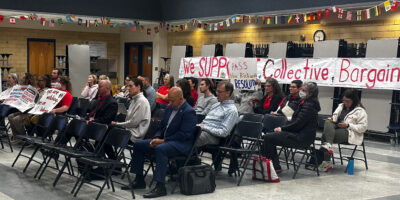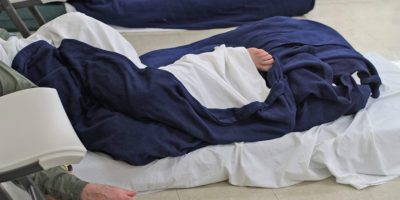
Editor’s note: This is the third article in an occasional series about the Lincoln Homestead outside of Harrisonburg. You can read the first installment about its new owners and the second story about the area expert on all things Lincoln.
By Bridget Manley, publisher
The records, or what are left of the records, are yellowing and difficult to read.
These matter-of-fact lists tell only names and ages of the people who were born and lived and died in chattel slavery serving the Virginia relatives of President Abraham Lincoln. And then they place a monetary value on each person.

They remain proof of life for people who might otherwise have been forgotten by history. And there aren’t many — if any — records that tell a wider story of the experience of what life was like as an enslaved person at the Lincoln Homestead. They also add morbid context to the practice of human slavery in America and, specifically, the Shenandoah Valley.
Phillip Stone and the Virginia Lincoln Society have collected and digitized the lists over the years.
One list bears the title “Names and Value of slaves owned by Abram Lincoln at the time of his death, the 13th of June, 1851.” Abram was a distant relative of the President.
“One boy named Levi, aged 6 years. Valued at $300.00”
“One girl named Harriett, aged 21 years. Valued at $450.00”
“One girl named Ann, aged 3 1/2 years. Valued at $200.00”
“One child named Ellen, aged 1 1/4 years. Valued at $150.00″
Now that the homestead has been purchased by Benjamin and Sarah Bixler, they have begun their own research trying to uncover the whitewashed history of enslaved people who lived there.
Robin Lyttle, president of the Shenandoah Valley Black Heritage Project, said although piecing together these records have been difficult, the digitization of records has made it much easier to find out more about the lives and history of enslaved people in the Valley.
The Bixlers are working with the Shenandoah Valley Black Heritage Project, as well as the Lincoln Society, to collect what’s left after historic fires destroyed some papers and over a century and a half of time has faded the collective memory.
Lyttle said she believes they can still unearth stories and trace the genealogy of those who were enslaved at the homestead, and she and her group of volunteer history detectives have begun that process.
“Because we also had a large freeborn population of African Americans in the Shenandoah Valley…we have more connections to more information for those families,” Little said. “Oral histories passed down within families are key elements.”
They have already found a few clues to start them on the path. Lucy Simms, the beloved and influential educator in Harrisonburg, was born a slave on a plantation near Blacks Run.. Her biography states that “Miss Simms was born into slavery in 1856 to the Gray family, who purchased her grandmother from a nearby cousin of Abraham Lincoln.”
Among the lists and the history books, there is another name — that of an enslaved man named Squire.
His name shows up later in another document found on the Library of Virginia’s digital collection. They are records of Squire’s execution, and his subsequent value paid to a Lincoln for his death.

Squire’s saga
Squire’s name appeared in John Wayland’s 1946 book, The Lincolns in Virginia. It appears once — in the index, which states, “1811 – April 7, Dorcas Robinson, widow of David Robinson, deeds to Captain Jacob Lincoln, husband of her daughter Dorcas, 3 negroes: Cate, Squire, and Jane…”
Squire was gifted to Jacob Lincoln, Jr. by Jacob’s mother-in-law, along with some furniture.
There is another record, housed at the Library of Virginia in its section “Virginia Untold: The African American Narrative” Collection.
These digitized records contain the handwritten public claims to the state of Virginia to obtain payment from the state for the execution of Squire. Inside the documents, Squire had been accused and found guilty in Rockingham County “of burning a barn…of the property of Abraham Lincoln of the value of One Thousand Dollars.”
He was sentenced to be hung on Oct. 29, 1841.
In the following documents in the record, clemency is mentioned, but it’s unknown what happened to Squire in the end. What is confirmed is that in October 1841, the state of Virginia paid Jacob Lincoln $281, which could represent the property value of a man executed.
In an email, Stone provided more context about the lineage.
“It should be noted that this is Jacob Lincoln, Jr, who lived across current Rt. 42 from his father’s house, the Lincoln Homestead,” Stone wrote. “Jacob, Sr., the Homestead builder, died in 1822, long before the arson event. His widow died in 1840 and their son Col. Abraham moved into the Homestead about that time. It must have been his barn that Squire was convicted of burning.”
During this period, according to the Library of Virginia’s notes about this record, the “General Assembly passed increasingly restrictive laws in response to white fears of slave crime and insurrection. Procedures were established to compensate slaveholders for the loss of their property when enslaved people ran away or were imprisoned or executed.”
Squire was enslaved by the Jacob Lincoln, Jr. family for 30 years before the alleged incident.
“We expected such stories to be uncovered, but seeing the actual records made it especially real,” The Bixlers said in an email. “His execution also seems like a property transaction – a man’s life exchanged for the burning of property. And we find that Jacob Lincoln got $280 compensation for the black body he counted as his property when the government sanctioned his execution.”
History goes up in flames
As the BIxlers continue to dig further into the history to find accounts of those enslaved at the Homestead, hurdles still stand in the way of fully understanding the lives of everyone who was enslaved there.
Rockingham County is one of Virginia’s “Lost Record Localities” because of two major incidents that happened centuries the digitization of records.
A courthouse fire in 1787 destroyed the estate records and wills of all records prior to that year.
The second event can be chalked up to best intentions gone terribly wrong.
According to the Library of Virginia, in June of 1864, the union troops were advancing into the Shenandoah Valley. Citizens, who were worried the Union would burn records, loaded volumes of records from the courthouse onto a wagon so that they could be saved. A judge granted the order to move the records to a safe place east of the Blue Ridge Mountains.
The wagon set off with reams of records inside. And as it reached Port Republic, a wheel and rim broke, and the wagon was stuck. Having no way to repair the wheel, the driver left the wagon until he could find replacements.
During that time, Union troops found it and set it on fire.
As the story goes, a mother of a Confederate soldier saw the burning wagon, and using water and straw, put out the fire and rescued what she could from the ashes.
In the years that followed, she gave what was left to families searching for their documents. The courthouse never received the documents back.
Most of the documents were considered gone forever, until 2005 when a researcher made an incredible discovery. In a box of loose papers, the researcher found leftover documents from the wagon fire, and these documents were painstakingly preserved and put onto microfilm that year.
There may have been more records regarding the lives of the enslaved people at the homestead, and time will tell what the volunteers with the Shenandoah Valley Black Heritage Project, the Bixlers and the Virginia Lincoln Society will be able to uncover.
Meanwhile, Lyttle has floated the idea of finding an intern to find out more about the life and death of Squire.
Homestead Open House Feb. 12

The first conversations the Bixlers hope to have with the general public will happen in the next few weeks.
They said they are excited to open their new home to the general public on the first Lincoln Day Ceremony that they will help host with Stone and the Lincoln Society.
After the ceremony, which takes place at the Lincoln Cemetery at 2 p.m. Feb. 12, the Bixlers will have an open house from 3-6 p.m. The public is welcome to tour the home and talk with the Bixlers about where their research has taken them and what they plan to do from here.
The Bixlers told The Citizen they welcome the opportunity to talk about the difficult parts of the Homestead, including the likely execution of Squire as well as the lists of names that contain nothing more than the ages and monetary value of human beings who were not allowed freedom.
“For us, just buying and living at the Lincoln Homestead makes us responsible, because we benefit from the lives and labor of people whom the Lincolns enslaved here and people whom the early settlers forced away,” the Bixlers said. “We’ve committed ourselves to learn not only about the Lincolns, but about all those who lived and died on this land. And we welcome the community to join us in wrestling with these questions and finding transformative ways to respond.”
Journalism is changing, and that’s why The Citizen is here. We’re independent. We’re local. We pay our contributors, and the money you give goes directly to the reporting. No overhead. No printing costs. Just facts, stories and context. Thanks for your support.











